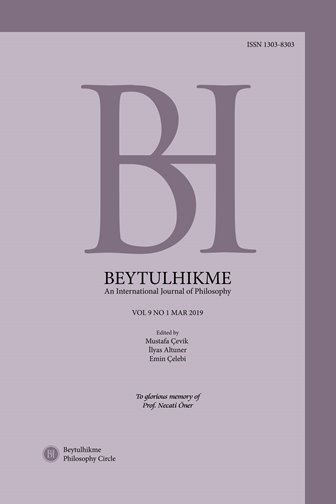Author :
Abstract
Sayı ve nicelik konusu binlerce yıldır tartışılan ve hala tanımının tam olarak yapılamadığı matematik felsefesinin en temel konusudur. Bu makalede İslâm felsefesinde sürekli ve süreksiz niceliği Pythagorasçı ve Aristotelesçi olmak üzere iki farklı yaklaşımla ele alan İhvan-ı Safa topluluğu ve İbn Sina gibi iki büyük felsefe ekolünün düşünceleri incelenmeye çalışılmıştır. Pythagorasçı öğretiden çok etkilenen İhvan-ı Safa, sayıları her şeyin temel ilkesi olarak kabul etmiş ve İhvan’la beraber Pythagorasçı anlayış İslâm’ın varlık anlayışının bir parçası haline gelmiştir. Diğer taraftan Aristotelesçi geleneğe bağlı kalan İbn Sina, kategoriler ekseninde ve cinslerin bağımsızlığı ilkesi bağlamında sürekli ve süreksiz nicelik kavramlarını ele almıştır.
Keywords
Abstract
The issue of number and quantity is the most fundamental subject of the philosophy of mathematics, which has been discussed for thousands of years and is still not fully defined. In this article, the thoughts of two major schools of philosophy such as the Ikhni-i Safa community and Avicenna (Ibn Sina) on the concepts of number and quantity were examined in Islamic philosophy. The Ikhwan-al-Safa, who was deeply influenced by the Pythagorean doctrine, considered the numbers as the basic principle of everything and the Pythagorean understanding with the Ikhwan became a part of the understanding of Islam. On the other hand, Avicenna who adhered to Aristotle tradition discussed the concepts of continuous and discrete quantity in the context of categories and in the context of the principle of independence of the types.
Keywords
- Aristoteles (2017). Metafizik. (Çev. A. Arslan). İstanbul: Divan Kitap Yayınları.
- Boyer, C. B. (2015). Matematiğin Tarihi. (Çev. S. Bağcacı). İstanbul: Doruk Yayın-
- Cevizci, A. (2008). Ortaçağ Felsefesi Tarihi. Bursa: Asa Kitabevi.
- Corry, L. (2017). Sayıların Kısa Tarihi. (Çev. Ö. Kesici). İstanbul: Doruk Yayınları.
- Demirci, M. F. (2015). İbn Sina’da Nicelikler ve Sayı, AİBÜ İlahiyat Fakültesi Der- gisi, 6 (3).
- İbn Sina (2014b). Metafizik. (Çev. E. Demirli & Ö. Türker). İstanbul: Litera Ya- yıncılık.
- İbn Sina (2013). Dânişnâme-i Alâi. (Çev. M. Demirkol), İstanbul: Türkiye Yazma Eserler Kurumu Başkanlığı.
- İbn Sina (2014a). Kategoriler. (Çev. M. Macit). İstanbul: Litera Yayıncılık.
- İbn Sina (2005). Fizik II. (Çev. M. Macit & F. Özpilavcı). İstanbul: Litera Yayıncı- lık.
- İhvân-ı Safâ (2017). İhvân-ı Safâ Risaleleri, c. 1. (Çev. Komisyon). İstanbul: Ayrıntı Yayınları.
- Karlığa, B. (1993) . Cisim. İslam Ansiklopedisi, c. 8. İstanbul: TDV Yayınları.
- Koçhan, M. & Kılıç, M. F. (2017). Matematik İhvan-ı Safa Felsefesinin Dayandığı Aksiyomatik Zemin midir?.Artuklu Akademi Dergisi, 4 (2).
- Nasr, S. H. (2006). İslam ve Bilim: İslam Medeniyetinde Pozitif Bilimlerin Tarihi ve Esasları. (Çev. İ. Kutluer). İstanbul: İnsan Yayınları.
- Nesin, A. (2010). Matematik ve Gerçek. İstanbul: Nesin Yayıncılık.
- Schimmel, A. (2018). Sayıların Gizemi. (Çev. M. Küpüşoğlu). İstanbul: Alfa Yayın-
- Tahiri, H. (2016). Mathematics and the Mind: An Introduction into Ibn Sina’s Theory of Knowledge. Cham: Springer.
- Uysal, E. (2000). İhvan-ı Safa. İslam Ansiklopedisi, c. 22. İstanbul: TDV Yayınları. Öz: Sayı ve nicelik konusu binlerce yıldır tartışılan ve hala tanımının tam olarak yapılamadığı matematik felsefesinin en temel konusudur. Bu makalede İslâm felsefesinde sürekli ve süreksiz niceliği Pythagorasçı ve Aristotelesçi olmak üzere iki farklı yaklaşımla ele alan İhvan-ı Safa topluluğu ve İbn Sina gibi iki büyük felsefe ekolünün düşünceleri incelenmeye çalışılmıştır. Pythagorasçı öğretiden çok etkilenen İhvan-ı Safa, sayıları her şeyin temel ilkesi olarak kabul etmiş ve İhvan’la beraber Pythagorasçı anlayış İslâm’ın varlık anlayışının bir parçası haline gelmiştir. Diğer taraftan Aristotelesçi geleneğe bağlı kalan İbn Sina, kategoriler ekseninde ve cinslerin bağımsızlığı ilkesi bağlamında sürekli ve süreksiz nicelik kavramlarını ele almıştır. Anahtar Kelimeler: İhvan-ı Safa, İbn Sina, sayı, nicelik, matematik felsefesi, Aristoteles, Pythagoras.





